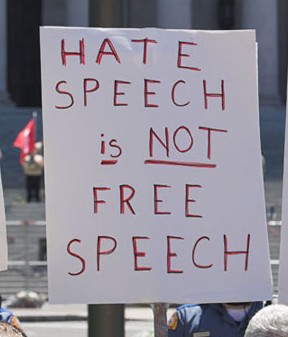
For more than three decades, there has been an accelerated degeneration in moral values, leading to the lack of social cohesion, with attendant implications for nation-building.
The systemic loss of values, elevation of mediocrity to state art, impunity, and corruption are not the main caused of free speech or social media phenomenon. Arguably, it is caused by moral degeneracy, intellectual degeneration, love of quick money, greed, and all other vices in between.
Hate speech cannot be accepted as a moral imperative. It is not. George Lakoff, Professor of Cognitive Science and Linguistics at the University of California-Berkeley, has argued that language can change brains for the better and the worse: “Hate speech changes the brains of those hated for the worse, creating toxic stress, fear and distrust—all physical.”
He also observed that this internal harm could even be more “severe than an attack with a fist.” In other words, speech acts that spew pure hate are fighting words, which directly harm their targets.
Hate speech is divisive. Hate speech is harmful to its targets. Hate speech could lead to violence and a national disaster. However, should it be regulated? Opinions differ, and countries have adopted different attitudes to this question.
What is hate speech, how is it defined as “threatening speech or writing that expresses prejudice against a particular group, especially based on race, religion, or sexual orientation.”
Due to people’s demographics and political history, the Gambia is an open theatre of hatred and bigotry since the beginning of its democratic and pluralistic experiment in 2017.
The Gambia inherently has been endowed with a multicultural ethos of diversity with many ethnic-linguistic groupings. The truth, however, is that of some minority of Gambians fraternise with their immediate neighbours’ boundaries with objects of hate. They have picked up the trash that Rwanda dropped off on her way to political development.
Without a doubt, social media has aided and given cover for ethnoreligious bigots, political anarchists, conspiracy theory peddlers, and bullies. Ethno-chauvinists have used and exploited social media platforms to devastating effect for recruiting apostles of hate and for disseminating their hateful and murderous doctrines.
The law on hate speech should be targeting these categories of people, especially those operating on social media network channels. The real targets are those active citizens not advocating bad governance and accountability. These brazen assaults on free speech and constitutional violations should be a cause for concern and should be condemned by all.
The United States is the most liberal of modern states in the matter of protecting free speech, including hate speech. Writing for four Justices in the Meatal versus Tam case in June 2017, Justice Alito of the U. S. Supreme Court observed that ‘the idea that the government may restrict speech expressing ideas that offend…strikes at the heart of the First Amendment. Speech that demeans based on race, ethnicity, gender, religion, age, disability, or any other similar ground is hateful, but the proudest boast of our free speech jurisprudence is that we protect the freedom to express “the thought that we hate.”’
“If all mankind minus one, were of one opinion, and only one person was of the contrary opinion, mankind would be no more justified in silencing that one person, than he, if he had the power, would be justified in silencing mankind.” John Stuart Mill.
Based on the belief that the clash of opinions in the marketplace of ideas promotes the truth, liberals oppose regulation of speech, which could negate the benefits of such exchange. Still, doesn’t it depend on the content of the opinions?
If a person insists that the world is round and another person insists that it is flat, they have a clash of opinions. With an open public debate, backed up with evidence on both sides, the truth will come out. No harm is done to society by the free exchange.
To many, however, this insistence on the predominance of freedom is easily defended, in the abstract, as a philosophical position, provided one is not in a position of political responsibility.
To these critics, there can be no absolute freedom, and people must find a balance between considerations of social harmony and individual freedom. Hence the political responsibility of drawing the line, which falls on representatives of the people.
For many, the opinion is too liberal. However, a state that gives no credence to freedom of expression but chooses the weapon of the law to regulate all speech is by no means an exemplar of liberalism. That is the road to totalitarianism, which is now generally discredited as a legitimate political practice even by those who exemplify it.
Across the Atlantic Ocean from the United States, on the other hand, the Gambia’s colonial masters appear to toe a middle line between an absolute liberal and a frightening totalitarian approach to hate speech. In the United Kingdom, there are hate speech laws that criminalise expressions of racial hatred against persons on account of their race, ethnicity, or nationality.
However, the laws insist that such expressions must be intended to stir up racial hatred or to result in stirring up racial hatred likely. These are presumably high bars for a prosecutor to clear.
By Alagi Yorro Jallow










Recent Comments